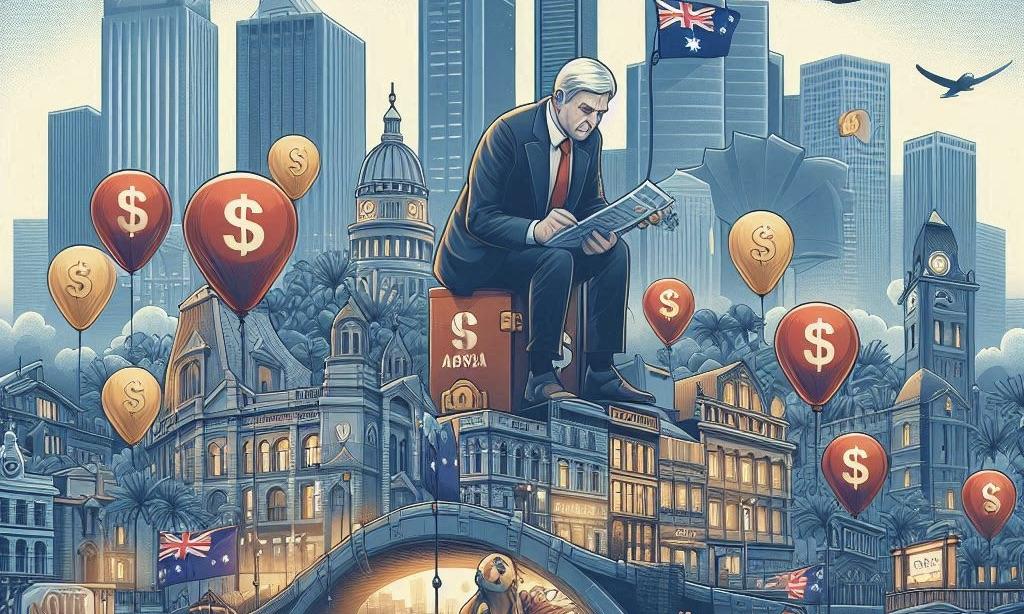Australia’s consumer inflation reached a three-year low in August, driven by falling diesel prices and electricity rebates. Despite this, core inflation remains above the Reserve Bank of Australia’s 2-3% target, complicating the outlook for potential interest rate cuts later this year.
Declining Diesel Prices and Government Rebates Drive Australia’s Inflation to a Three-Year Low in August
August witnessed a significant development in the Australian consumer price inflation rate, marking its lowest level in three years. According to Reuters, this notable shift was primarily attributed to a decline in diesel prices and government rebates on electricity. Furthermore, the core inflation, hitting its lowest point since early 2022, indicates a moderation in cost pressures.
The market's response was subdued, as the Reserve Bank of Australia (RBA) had previously indicated that it would not assign significant significance to the decrease in headline inflation, which is insufficient to warrant near-term rate reduction. The Australian dollar, which had recently reached a 1-1/2-year high, remained unchanged at $0.6890, while three-year bond futures exhibited minimal movement at 96.64. The RBA's decision to maintain policy stability without contemplating a hike earlier this week has resulted in a 75% likelihood that the bank will begin reducing rates in December, as indicated by swaps.
The monthly consumer price index (CPI) increased at an annual rate of 2.7% in August, a decrease from the 3.5% increase in July, as indicated by the Australian Bureau of Statistics data. This decrease was consistent with market expectations. The Consumer Price Index (CPI) decreased by 0.2% month-to-month in July. Electricity prices declined by nearly 15% in August, while petrol prices decreased by 3.1%. The most significant annual decline since the early 1980s was achieved by electricity prices, which decreased by 17.9% annually due to subsidies from the federal and state governments. In August, electricity prices would have increased by 0.1% if these subsidies had not been in place.
RBA Maintains 4.35% Cash Rate as Core Inflation Remains Above Target, Limiting Rate Cut Prospects
Since November, the Reserve Bank of Australia (RBA) has maintained the cash rate at 4.35%, a substantial increase from the pandemic-era low of 0.1%. The central bank believes this restrictive policy can restore inflation to its 2-3% target while safeguarding employment advances. Nevertheless, policymakers are apprehensive about the trajectory of inflation toward the target range, as underlying inflation, which was 3.9% in the previous quarter, has experienced only a minor decrease over the past year.
In August, the trimmed mean, a critical core inflation indicator, decreased from 3.8% to 3.4% annually. Nevertheless, it remains above the Reserve Bank of Australia's 2-3% target range. Potential interest rate reductions continue to be impeded by the elevated level of core inflation. Additionally, the monthly report presented a quarterly update on services inflation, which experienced only a minor decrease to 4.2% in August from 4.4% in July.
Dwyfor Evans, Head of APAC Macro Strategy at State Street Global Markets, noted that the trimmed mean rate was lower, albeit not to the same extent as the headline rate. This observation underscores the RBA's cautious approach to inflation trends, indicating that the RBA will likely consider the anomalous price data from the previous month in its future policy decisions.



 PBOC Scraps FX Risk Reserves to Curb Rapid Yuan Appreciation
PBOC Scraps FX Risk Reserves to Curb Rapid Yuan Appreciation  Boeing Secures $166.8 Million U.S. Navy Contract for P-8A Engineering and Software Support
Boeing Secures $166.8 Million U.S. Navy Contract for P-8A Engineering and Software Support  Nintendo Share Sale: MUFG and Bank of Kyoto to Sell Stakes in Strategic Unwinding
Nintendo Share Sale: MUFG and Bank of Kyoto to Sell Stakes in Strategic Unwinding  Dominican Republic Unveils Massive Rare Earth Deposits to Boost High-Tech and Energy Sectors
Dominican Republic Unveils Massive Rare Earth Deposits to Boost High-Tech and Energy Sectors  Netflix Declines to Raise Bid for Warner Bros. Discovery Amid Competing Paramount Skydance Offer
Netflix Declines to Raise Bid for Warner Bros. Discovery Amid Competing Paramount Skydance Offer  Australian Dollar Rallies on Hawkish RBA Outlook; Yen Slips as BOJ Faces Political Pressure
Australian Dollar Rallies on Hawkish RBA Outlook; Yen Slips as BOJ Faces Political Pressure  Trump Orders Federal Agencies to Halt Use of Anthropic AI Technology
Trump Orders Federal Agencies to Halt Use of Anthropic AI Technology  Greg Abel’s First Berkshire Hathaway Shareholder Letter Signals Continuity, Caution, and Capital Discipline
Greg Abel’s First Berkshire Hathaway Shareholder Letter Signals Continuity, Caution, and Capital Discipline  Gold Prices Surge Over 2% After U.S.-Israel Strikes on Iran Spark Safe-Haven Demand
Gold Prices Surge Over 2% After U.S.-Israel Strikes on Iran Spark Safe-Haven Demand  Wall Street Futures Tumble as U.S.-Iran Conflict Escalates and Oil Prices Surge
Wall Street Futures Tumble as U.S.-Iran Conflict Escalates and Oil Prices Surge  Bank of Japan Signals Further Interest Rate Hikes as Inflation Trends Toward 2% Target
Bank of Japan Signals Further Interest Rate Hikes as Inflation Trends Toward 2% Target  FedEx Faces Class Action Lawsuit Over Tariff Refunds After Supreme Court Ruling
FedEx Faces Class Action Lawsuit Over Tariff Refunds After Supreme Court Ruling  Global Markets React as Dollar Surges, Swiss Franc Rallies After U.S.-Israel Strike on Iran
Global Markets React as Dollar Surges, Swiss Franc Rallies After U.S.-Israel Strike on Iran  FCC Approves Charter Communications’ $34.5 Billion Acquisition of Cox Communications
FCC Approves Charter Communications’ $34.5 Billion Acquisition of Cox Communications  Qantas Shares Plunge 10% as Iran Strikes Send Oil Prices Soaring and Disrupt Global Flights
Qantas Shares Plunge 10% as Iran Strikes Send Oil Prices Soaring and Disrupt Global Flights 































